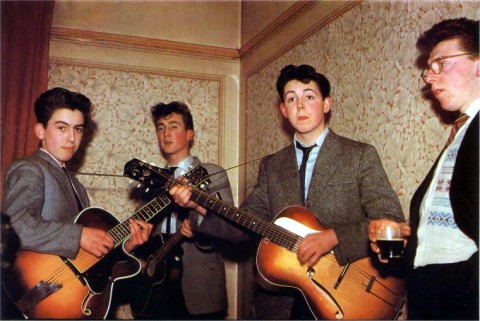The Beatles as Teens (1957)
What Would MLK Say About the USA Today?
What would Martin Luther King Jr. think about America in 2010? Few would know better than Clayborne Carson, the Stanford historian who directs the Martin Luther King, Jr. Research and Education Institute. In this talk, Carson describes MLK’s likely thoughts about America during the Great Recession. King cared deeply about economic justice, and it’s clear that King wouldn’t have looked unambivalently upon the inequalities that the financial meltdown made so glaringly obvious. Next week, the U.S. will celebrate King’s birthday and bankers will collect their record-setting bonuses …
Note: Clayborne Carson is currently holding Open Office Hours on Stanford’s Facebook Page. Be sure to visit. Also, Professor Carson has taught an online course that you can freely download. It’s called African-American History: Modern Freedom Struggle, and you can find it on YouTube and iTunes. It’s also the first course that appears in our collection of Free Courses.
B- Classic Movies Now Online
If you get your kicks from uber kitschy B- films, then we’ve got a little something for you. AMC has launched a new site called B- Minus Classics, which we have added to our growing collection of Free Movies Online. (Our list now contains 125 free classic movies, and numerous sites where you can watch free movies online). AMC describes its new site as:
Your new go-to site for B‑movies by the likes of John Carpenter (Dark Star) and Roger Corman (Saga of the Viking Women). Now online and in full screen, watch unsung classics like Asylum by Psycho screenwriter Robert Block or Corridors of Blood with the inimitable Christopher Lee. Want to see international icons before they made it big? Check out Raquel Welch in A Swingin’ Summer or kung fu king Sonny Chiba in Terror Beneath the Sea. Looking for the unexpected? How about The Ruthless Four, a spaghetti Western starring Klaus Kinski. Now updated with even more B‑movies featuring femmes fatales (The Cat Girl), jungle adventures (Curse of the Voodoo) and talking ventriloquist’s dummies (Devil Doll). Whatever your B‑movie taste, BMC has got you covered.
Thanks to @brainkpicker for flagging this new collection.
Vladimir Horowitz Plays Mozart Back in the USSR
Vladimir Horowitz, one of the great pianists of the 20th century, left Russia to settle in the United States in 1939. But, once the Cold War thawed, he famously returned home and played before rapt audiences. What we have here, I believe, is Horowitz playing Mozart’s Sonata in C Major during a 1986 recital Moscow. A beautiful piece. For good measure, I’ve also added Horowitz playing Chopin’s 2nd Piano Sonata at the White House. Both clips have been added to our YouTube favorites.
Two Gentlemen of Lebowski
Take the Coen Brothers’ 1998 cult film, The Big Lebowski, and put it in Shakespearean verse, and what do you get? Two Gentlemen of Lebowski as written by Adam Bertocci. It begins:
In wayfarer’s worlds out west was once a man,
A man I come not to bury, but to praise.
His name was Geoffrey Lebowski called, yet
Not called, excepting by his kin.
That which we call a knave by any other name
Might bowl just as sweet. Lebowski, then,
Did call himself ‘the Knave’, a name that I,
Your humble chorus, would not self-apply
In homelands mine; but, then, this Knave was one
From whom sense was a burden to extract,
And of the arid vale in which he dwelt,
Also dislike in sensibility;
Mayhap the very search for sense reveals
The reason that it striketh me as most
Int’resting, yea, inspiring me to odes.
The Wall Street Journal has more on this creative bit that has gone viral during the past week, and will be soon performed on stage in NYC. See Kottke.org for more on that.
The Neurons That Shaped Civilization
TED recently took its show to India, and one of the more interesting presentations featured neuroscientist Vilayanur Ramachandran (UCSD) explaining how mirror neurons, a recently discovered system in the brain, “allow us to learn complex social behaviors, some of which formed the foundations of human civilization,” and also helped us evolve as a species. Good stuff. You can find more TED India Talks here.
Stanford Releases New iPhone App Development Course
Last year, Stanford University gave iPhone owners around the world a boost when it released a free iPhone App Development course (find it on iTunes). Millions have since downloaded the lectures, and many new iPhone apps have been created as a result. (Partly thanks to this course, we developed our own Free iPhone App that gives you mobile access to our educational media collections — free audio books, free university courses, free language lessons, etc. Get our app here.)
This week, Stanford has started rolling out a new App Development course (get it in video on iTunes), one adapted to the new iPhone operating system that Apple released last summer. Two lectures have been released so far. More will get rolled out on a weekly basis. Please note, these courses also appear in our collection of Computer Science Courses, a subset of our larger collection of Free Courses from leading universities.
A.C. Grayling on “Teaching the Controversy”
In this clip from Richard Dawkins’ YouTube Channel, philosopher A.C. Grayling offers an argument for why intelligent design should’t be taught alongside evolution in the classroom. Some will agree with his position, and some won’t. And probably few will have no opinion. If you have reactions to Grayling’s argument, please state them civilly and intelligently in the comments below.
via @courosa


